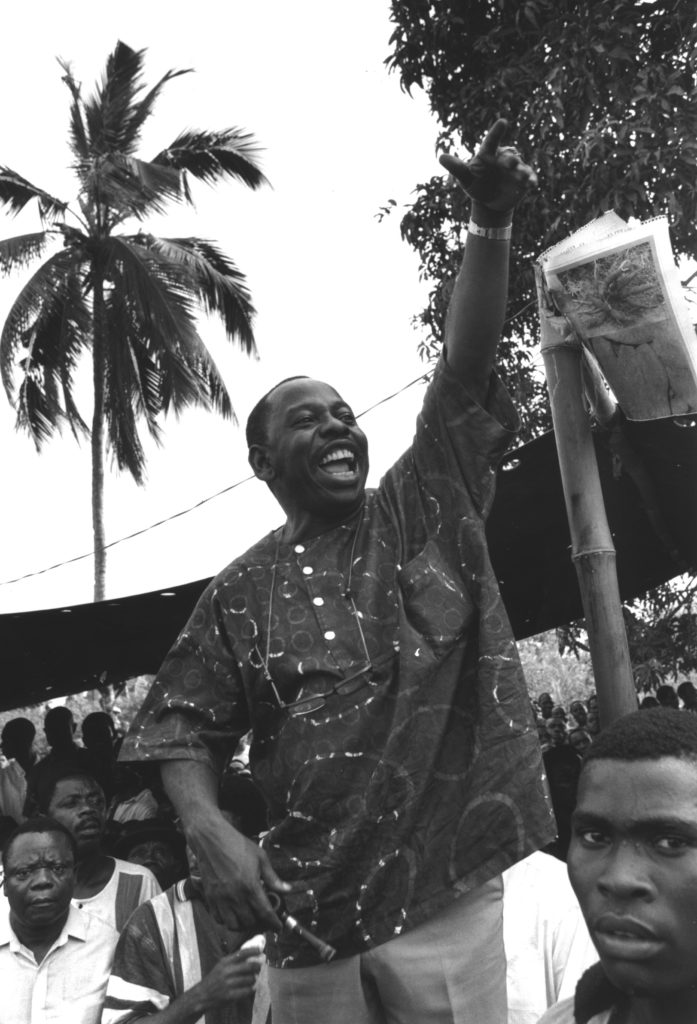
Ken Saro-Wiwa, local leader, speaking at Ogoni Day demonstration, Nigeria. The demonstration was officially called to mark the start of UNICEF’s International Year of Indigenous People, but unofficially it was against the Shell oil company. Shell operates many oilfields in the Bori region and there have been many blowouts and leaks.
© Tim Lambon/Greenpeace
This Story belongs to the Writers in Prison Committee.
Biography
Ken Saro-Wiwa was born in October 1941 in Bori, Nigeria. After graduating from the University of Ibadan he worked briefly as a teacher before his best known novel, Sozaboy: A Novel In Rotten English, an anti-war satire, was published in 1985. This was followed by his second book, On A Darkling Plain, about his experiences in the Nigerian Civil War. He subsequently went on to write numerous novels, as well as the hugely popular television sitcom, Basi and Company, for which he wrote over 150 episodes.
In 1990 Saro-Wiwa joined the Movement for the Survival of the Ogoni People (MOSOP). He campaigned for greater autonomy for the Ogoni lands and demanded that the international oil corporations (namely Shell) share revenues made on oil extracted from Ogoni land and clean up the environmental damage the extraction had caused.
Ken Saro-Wiwa was first arrested in 1992 and detained for several months before being released. In January 1993 MOSAP led a peaceful demonstration which was violently suppressed by the Nigerian security services and five months later Saro-Wiwa was imprisoned for a month.
On 21 May 1994, four Ogoni chiefs from a different faction of MOSOP to Saro-Wiwa were killed by a mob of militant MOSOP supporters. Saro-Wiwa (who earlier had been prevented from attending a meeting with the four chiefs) was arrested along with fourteen other MOSOP leaders and charged with inciting the murders.
Ken Saro-Wiwa was convicted of the murder despite many observers claiming that the trial had been rigged. On 10 November 1995, after an extensive international campaign led by centres of International PEN, Saro-Wiwa was executed. His death led to an international outcry.
The next year a collection of his essays written during incarceration was published—A Month And a Day: A Detention Diary.
In 1996 a lawsuit was filed against Shell alleging their complicity in human rights abuses in Nigeria including the execution of Ken Saro-Wiwa. In June 2009, Shell agreed to pay a settlement of fifteen and a half million dollars despite claiming it was not guilty of the charge.
Writing Sample
Physical torture did not kill me. Nor did mental torture. Then, one night, the ghost arrived. Tall and gangly, dressed in ragged Nigerian Army camouflage uniform, his bones shooting out of holes in his uniform, his brown teeth as huge as tusks projecting from enormous lips, he came to me, automatic weapon slung over his shoulder, a little drum, an Ogoni drum called “Ekoni”, in his hand. He sounded the drum, Ken-ti-mo, Ken-ti-mo, Ken-ti-mo!
The familiar sound woke me up. At the sight of the ghost, I laughed. Annoyed at my laughter, he dropped the drum and laid hold of his automatic weapon. He pointed it at me at close range. I did not flinch. He cocked the weapon and fingered the trigger. I did not bat a eyelid.
‘Who are you?’ I asked.
‘I’m General Jeno Saidu.’
‘Sounds like genocide to me,’ I said.
‘You should know’
‘What do you want?’ I asked.
‘I’m here to finish you’ replied he, in a gruff voice.
‘General, stop swaggering. You do not impress me.’
‘You will be impressed. I’ve finished your Ogoni people – men, women and children. Once I deal with you, my task is done.’
‘Go ahead,’ I challenged him.
‘Your not afraid to die?’
‘No.’
‘Why not?’
‘I’m prepared to go with my people who you confess to have already murdered.’
‘Yes, I worked hard on them. I made short work of them. All five hundred thousand of them. You are the last man.’
‘So go ahead’
General Jeno Saidu, the ghost, shot into the ceiling. I laughed.
‘Why did you shoot into the ceiling and not my chest?’
‘Your still not afraid?’
‘No, General.’
‘And why not?’
‘Because I have what is greater than your weapon.’
Whereupon, I said after the English poet Blake:
‘I will not cease my mental fight
Nor shall my pen sleep in my hand
Till they have built a new Ogoni
In Niger delta’s wealthy land.’
Then I drew my pen from under my pillow. The General’s weapon fell from his hand, and he slumped to his knees…
From On the Death of Ken Saro-Wiwa in Another Sky: Voices of conscience from around the world. ed. Lucy Popescu and Carole Seymour-Jones (London: Profile, 2007) ISBN: 1861978405
From the 50th Anniversary of the Writers in Prison Committee campaign materials, 2010
Useful links
Review of the life and legacy of Ken Saro Wiwa, Jacobin, 2019: https://www.jacobinmag.com/2019/11/ken-saro-wiwa-nigeria-environment-oil-companies-ogoni
Wikipedia item on Saro Wiwa: http://en.wikipedia.org/wiki/Ken_Saro-Wiwa
‘Shell pays out $15.5 m over Saro Wiwa Killing, June 2009: http://www.guardian.co.uk/world/2009/jun/08/nigeria-usa